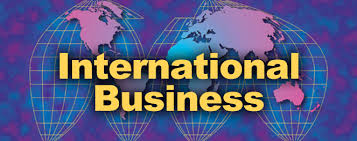 Advancing technology, innovative methods, and better communication have pushed business to global frontiers. In response, industries have gone international to markets beyond their country’s borders. International business describes all of the commercial transactions, both governmental and private, that take place between different countries. Though the term international business is a relatively new concept, international trade has been around since the dawn of civilization. Ancient cultures such as the Roman Empire, Egypt, and Europe traded different goods. Merchants traveled great distances to foreign lands to make money and business connections. Even archaeology reveals the various routes people traveled in different regions of the world.
Advancing technology, innovative methods, and better communication have pushed business to global frontiers. In response, industries have gone international to markets beyond their country’s borders. International business describes all of the commercial transactions, both governmental and private, that take place between different countries. Though the term international business is a relatively new concept, international trade has been around since the dawn of civilization. Ancient cultures such as the Roman Empire, Egypt, and Europe traded different goods. Merchants traveled great distances to foreign lands to make money and business connections. Even archaeology reveals the various routes people traveled in different regions of the world.
How International Business Has Increased in the Past Century
Improved political relationships along with the ease of government restrictions has helped increase trade on the global market. The U.S. imports and exports goods from all over the world, and the amount has increased over the years with countries like China and Brazil. Those nations, along with many others, have experienced rapid growth and increased stability with governing. Emerging middle classes in several countries yielded a greater demand for more goods, both domestic and foreign. More consumers know about and want foreign goods and now have the money to buy them. With more countries participating in global business, competition has heated up (to sometimes volatile levels) and in turn sparked more interest in international goods.
The U.S. stands out from other nations in enjoying brand recognition around the world. As a country, the U.S. is a dominant cultural force, with goods exported to most nations on the planet. As a major presence in international business, the U.S.’s place in the global market continues to grow. Most major companies in America have stores and office in several other countries around the world. Brands like Walmart, Apple, Coca-Cola, and many others are global companies. However, the U.S. is not the only country which has achieved this. There are many other nations that do business globally and they have a significant presence as well.
Technology’s influence has been powerful in all sectors of international business. From communication to transportation and everything in between, technological innovation has been a guiding force in global industries. Anyone with the Internet and a credit card can buy merchandise online and have it shipped to their home. They can also make travel arrangements, communicate, and conduct business online. Computers, especially the personal computer, have revolutionized global industries and opened consumers up to markets they would not have access to otherwise.
The Global Economy has Become Standard In The Way Most Major Businesses Are Now Operating
All of these factors have pushed (and will continue to push) businesses and companies to evaluate their strategies. With technology and communications at the forefront, the possibilities for the future seem limitless. Companies work on a global scale, bringing more people and cultures into business trade. It is an exciting field that will keep growing and changing the way countries do business. The coming years hold tremendous potential for new and innovative ways of working in a global market.
Today, an international business degree is a highly in-demand diploma to pursue. Without highly educated, skilled professionals willing to work in the dynamic global business industry, it would not exist and evolve as it does. Those interested in pursuing or have already established careers in international business must always be thinking globally, possess desire to learn about foreign cultures, and want to expand business options. Learning the skills and knowledge to manage global business environments, handle multicultural and multinational issues, and apply critical thinking to problem solve are essential to continuing the forward momentum of international business.
